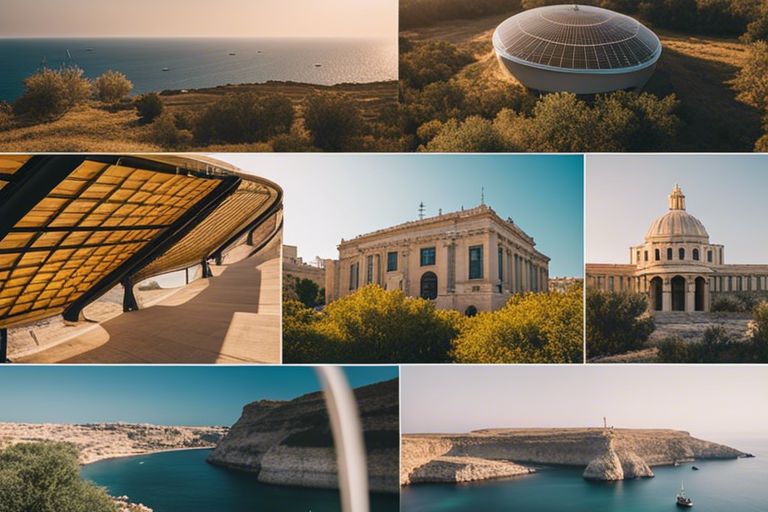Sustainable Travel in Malta

With the increasing awareness of the impact of tourism on the environment, more and more travelers are seeking ways to reduce their carbon footprint while exploring new destinations. In the idyllic Mediterranean island of Malta, there are plenty of opportunities to practice sustainable travel and enjoy a responsible holiday. From eco-friendly accommodations to locally sourced cuisine, there are various ways to make your trip to Malta more environmentally friendly.
In the matter of transportation, choosing public transport, cycling, or walking over renting a car can significantly reduce your emissions. Malta’s compact size makes it easy to get around without a vehicle, and you can explore the charming streets and historic sites on foot or by bike. Additionally, supporting local businesses and artisans not only benefits the community but also reduces the environmental impact of imported goods.
Explore eco-friendly attractions such as the stunning Dingli Cliffs, the majestic Blue Grotto, or the picturesque Golden Bay. These natural wonders showcase the beauty of Malta while emphasizing the importance of preserving its fragile ecosystems. By practicing sustainable travel habits and visiting environmentally conscious spots, you can enjoy a guilt-free vacation in Malta while contributing to the conservation of its natural heritage.
The Importance of Sustainable Travel
Environmental Impact of Tourism
To truly understand the importance of sustainable travel in Malta, it is necessary to recognize the environmental impact that tourism can have on this beautiful island nation. The influx of tourists can lead to increased energy consumption, waste generation, and carbon emissions, putting a strain on Malta’s delicate ecosystems. Irresponsible tourism practices can degrade natural habitats, contribute to air and water pollution, and harm local wildlife populations.
Preserving Malta's Natural Beauty
On the picturesque archipelago of Malta, preserving the natural beauty is crucial for the long-term sustainability of the island. Malta boasts stunning coastlines, crystal-clear waters, and unique biodiversity that must be protected for future generations to enjoy. Sustainable travel practices such as supporting local conservation efforts, choosing eco-friendly accommodations, and engaging in responsible waste management can help in preserving Malta’s natural treasures.
Engaging in activities that promote environmental conservation, such as participating in beach clean-ups, supporting sustainable tour operators, and respecting wildlife habitats, plays a vital role in preserving Malta’s natural beauty. By adopting eco-friendly behaviors during your visit, you can contribute to the preservation of Malta’s unique landscapes and marine ecosystems.
Economic and Sociocultural Benefits
Sustainable travel not only benefits the environment but also has significant economic and sociocultural advantages for Malta. By supporting local businesses, artisans, and traditional crafts, tourists can help stimulate the local economy and preserve Malta’s cultural heritage. Additionally, engaging in authentic cultural experiences and respecting local customs fosters mutual respect and understanding between tourists and the Maltese community.
By valuing and protecting Malta’s cultural heritage, diverse traditions, and historic sites, sustainable travel practices contribute to the preservation of the island’s identity and sense of place. This approach ensures that the social fabric of Malta remains intact, enriching visitor experiences and strengthening the bonds between travelers and the local community.
Planning Your Trip
Best Times to Visit Malta Sustainably
It is important to consider the best times to visit Malta sustainably when planning your trip. One of the optimal times to travel to Malta with minimal impact on the environment is during the shoulder seasons of spring (April to June) and autumn (September to November). During these times, the weather is pleasant, the tourist crowds are smaller, and you can explore the beautiful Maltese islands in a more sustainable way.
Visiting during the off-peak months of November to March can also help reduce your environmental footprint, as there are fewer visitors, accommodations are more affordable, and you can support local businesses during quieter periods. Avoiding the peak summer months of July and August can help alleviate overtourism and reduce strain on the island’s resources.
By planning your trip during these quieter periods, you can enjoy a more sustainable and eco-friendly travel experience in Malta while also supporting local communities and preserving the natural beauty of the islands.
Eco-Friendly Travel Agencies and Packages
Times are changing, and more travelers are seeking eco-friendly travel options when exploring destinations like Malta. There are now a variety of travel agencies and tour operators that specialize in sustainable tourism practices, offering eco-friendly travel packages that prioritize responsible travel initiatives. These agencies work with local communities to promote cultural preservation, support environmental conservation efforts, and provide authentic experiences for travelers.
When booking your trip to Malta, consider opting for eco-friendly travel agencies and packages that align with your values and commitment to sustainable travel. These tours often include activities such as hiking, cycling, and wildlife conservation experiences that minimize negative impacts on the environment and help you make a positive contribution to the places you visit.
By choosing eco-friendly travel agencies and packages, you can enjoy a guilt-free vacation in Malta while contributing to the conservation of its natural and cultural heritage. These initiatives not only benefit the environment but also create meaningful connections with local communities and promote sustainable tourism practices for future generations to enjoy.
Sustainable Travel Insurance Options
Sustainable travel insurance options are becoming increasingly popular among eco-conscious travelers. These policies are designed to support sustainable practices such as carbon offsetting, wildlife conservation, and community development projects in the destinations you visit. By opting for sustainable travel insurance, you can ensure that your trip to Malta has a positive impact on the environment and local communities.
When choosing eco-friendly travel insurance options, look for policies that prioritize sustainable tourism initiatives and support ethical practices. These insurance providers often partner with environmentally friendly organizations and promote responsible travel behaviors that align with sustainable development goals. By investing in sustainable travel insurance, you can travel with peace of mind knowing that your trip is contributing to the preservation of Malta’s natural and cultural heritage.
Eco-Friendly Transportation in Malta
Advantages of Public Transport
To tackle the environmental impact of transportation, opting for public transport in Malta is a wise choice. The public bus system is efficient, covering most of the island and providing a cost-effective way to travel. By using public transport, you can significantly reduce your carbon footprint and contribute to the preservation of Malta’s natural beauty. Moreover, public transportation allows you to immerse yourself in the local culture and interact with the friendly Maltese people.
Bike Rentals and Green Routes
With bike rentals widely available in Malta, exploring the island on two wheels is not only eco-friendly but also a fantastic way to stay active. Many companies offer green routes that guide cyclists through scenic spots, historical sites, and charming villages. By pedaling along these routes, you can experience Malta’s beauty up close while minimizing your impact on the environment.
A popular bike route is the one along the picturesque Dingli Cliffs, offering breathtaking views of the Mediterranean Sea. With various rental options and well-maintained paths, cycling on the island is both convenient and enjoyable. The bike rental shops can provide you with all the necessary equipment, ensuring a safe and eco-friendly journey.
Electric Car Hire and Charging Points
For those looking for a more convenient and luxurious way to travel sustainably, electric car hire services are available in Malta. Transportation using electric vehicles significantly reduces emissions and noise pollution, making it an eco-conscious choice. Many charging points are scattered across the island, allowing you to easily recharge your electric car and continue your exploration without harming the environment.
Transport in eco-friendly vehicles also offers a unique and comfortable travel experience, enabling you to visit distant locations and hidden gems in Malta while minimizing your ecological impact. Whether you’re cruising along the coastal roads or navigating the ancient streets of Mdina, electric cars provide a sustainable and stylish way to discover the island.
Walking Tours and Hiking
Immerse yourself in Malta’s natural wonders by begining on walking tours and hiking adventures. Transportation by foot not only allows you to reduce your carbon footprint but also gives you the opportunity to connect with the island’s stunning landscapes and rich history. From guided walking tours in Valletta to challenging hikes in Gozo, there are options for all levels of fitness and interests.
Many trails lead you through Malta’s countryside, offering panoramic views, ancient ruins, and peaceful surroundings. By choosing to explore the island on foot, you can experience a deeper connection with nature and support sustainable tourism practices. Remember to pack importants like water, sunscreen, and comfortable footwear for an enjoyable and eco-friendly adventure.
Green Accommodation
Certified Eco Hotels in Malta
All hotels in Malta are making an effort to become more sustainable, but certified eco hotels go above and beyond in their green initiatives. These accommodations have been recognized for their commitment to reducing their environmental impact through various initiatives, such as energy-efficient practices, waste reduction programs, and water conservation efforts.
The certified eco hotels in Malta often source local and organic produce for their restaurants, use renewable energy sources, and employ eco-friendly cleaning products. By choosing to stay in these accommodations, travelers can support environmentally conscious businesses that are dedicated to protecting Malta’s natural beauty for future generations.
Staying in a certified eco hotel not only allows travelers to enjoy a guilt-free vacation but also promotes sustainable tourism practices that help preserve Malta’s delicate ecosystems and reduce the carbon footprint of their stay.
Sustainable Hostels and Guesthouses
The sustainable hostels and guesthouses in Malta cater to budget-conscious travelers looking for environmentally friendly accommodation options. These establishments implement green practices such as recycling programs, energy-efficient lighting, and water-saving initiatives to minimize their impact on the environment.
For those seeking a more authentic and community-oriented travel experience, sustainable hostels and guesthouses provide a unique opportunity to connect with like-minded travelers and support local initiatives that promote environmental conservation and sustainable living.
Choosing to stay in a sustainable hostel or guesthouse not only benefits the environment but also allows travelers to immerse themselves in Malta’s local culture and contribute to responsible tourism efforts in the region.
Environmentally Friendly Camping Sites
To experience Malta’s stunning natural landscapes up close, travelers can opt for environmentally friendly camping sites that offer sustainable accommodation options amidst nature. These sites promote low-impact camping practices and provide facilities that run on renewable energy sources.
For travelers looking to disconnect from technology and reconnect with nature, environmentally friendly camping sites offer a chance to sleep under the stars and wake up to the sounds of the wilderness. These sites are perfect for nature enthusiasts and adventurous travelers seeking a more eco-conscious way to experience Malta.
Staying at an environmentally friendly camping site allows travelers to appreciate Malta’s natural beauty while minimizing their impact on the environment, making it an ideal choice for those who prioritize sustainable travel practices.
Green Certification Standards for Lodging
It is vital for travelers to look for accommodations that adhere to green certification standards to ensure that their stay is environmentally responsible. These standards encompass a range of criteria, including energy efficiency, waste management, and community engagement initiatives that contribute to sustainable tourism practices.
Hostels, hotels, and guesthouses that meet green certification standards demonstrate their commitment to environmental stewardship and sustainable development in the hospitality industry. By supporting these establishments, travelers can help protect Malta’s natural resources and promote ecotourism in the region.
This ensures that travelers can enjoy their stay in Malta while minimizing their environmental impact and contributing to conservation efforts</strong that are crucial for the sustainability of the island’s ecosystems.
Sustainable Eating and Drinking
Organic Restaurants and Cafes
Keep your sustainability goals in check while exploring the culinary scene in Malta by opting for organic restaurants and cafes. These establishments prioritize locally sourced and sustainable ingredients, ensuring that your dining experience is not only delicious but also environmentally friendly. By supporting organic eateries, you are contributing to the preservation of natural resources and promoting a healthier food system.
The organic restaurants and cafes in Malta offer a wide range of options for conscious consumers, from farm-to-table dining experiences to cozy coffee shops serving ethically sourced beverages. Whether you’re grabbing a quick bite or sitting down for a leisurely meal, you can rest assured that your food and drinks are produced with a focus on sustainability.
When dining at organic establishments, take the opportunity to engage with the staff and learn more about their sourcing practices. By showing interest in their sustainable initiatives, you are not only supporting their business but also encouraging others to follow suit in making more eco-conscious choices.
Local and Seasonal Food Choices
On your journey to sustainable eating in Malta, prioritizing local and seasonal food choices is key. Embracing the flavors of the region not only allows you to savor the freshest ingredients available but also reduces the carbon footprint associated with food transportation. By opting for dishes made with local produce, you are supporting small-scale farmers and promoting biodiversity in the area.
With the Mediterranean climate influencing the availability of ingredients throughout the year, exploring local and seasonal food choices in Malta is a delightful experience. From ripe tomatoes in the summer to hearty root vegetables in the winter, each season offers a unique culinary palette to indulge in. By aligning your meals with the seasonal offerings, you are not only enjoying the best flavors but also contributing to a more sustainable food system.
Vegan and Vegetarian-Friendly Spots
With the rising popularity of plant-based diets, Malta has seen an increase in vegan and vegetarian-friendly spots that cater to eco-conscious diners. These establishments offer a variety of dishes that are not only delicious but also cruelty-free and environmentally sustainable. Whether you’re a seasoned vegan or simply looking to reduce your meat consumption, exploring these spots can introduce you to a world of flavorful and sustainable dining options.
With a focus on plant-based ingredients, vegan and vegetarian-friendly spots in Malta showcase the versatility of fruits, vegetables, grains, and legumes in creating satisfying meals. From vibrant salads to hearty plant-based burgers, these eateries provide a delicious array of options that are kind to both your taste buds and the planet. By supporting these establishments, you are contributing to the reduction of greenhouse gas emissions associated with animal agriculture and promoting a more sustainable food system.
Reducing Plastic Use While Dining
For a truly sustainable dining experience in Malta, it’s crucial to prioritize reducing plastic use while enjoying your meals. Opt for restaurants and cafes that offer plastic-free alternatives, such as reusable utensils, straws, and containers. By choosing establishments that are committed to eliminating single-use plastics, you are taking a proactive step towards reducing plastic pollution and safeguarding the environment.
To further reduce plastic use while dining, consider bringing your own reusable water bottle and food containers when eating out. By carrying these items with you, you can minimize your environmental impact and inspire others to adopt plastic-free practices. Additionally, by supporting plastic-conscious establishments, you are sending a clear message to the food industry about the importance of sustainability in dining experiences.
Eco-Friendly Activities and Attractions
Nature Reserves and Parks
Despite being a small island country, Malta boasts several nature reserves and parks that offer visitors a glimpse of the diverse ecosystems present on the islands. One of the must-visit attractions for nature lovers is the Majjistral Nature and History Park, located in the northwest of Malta. This park spans over 6km of undeveloped coastline and is a haven for birdwatching, hiking, and exploring local flora and fauna.
Another prominent natural reserve is the Buskett Gardens, a woodland area with a history dating back to the Phoenician times. It’s an ideal spot for a leisurely stroll and birdwatching, with a diverse range of tree species and wildlife to admire. For those interested in marine conservation, a visit to the Blue Grotto and St. Peter’s Pool offers a chance to appreciate the stunning natural rock formations and crystal-clear waters.
Exploring these nature reserves not only offers a peaceful retreat from the bustling urban areas but also allows visitors to connect with Malta’s natural beauty and contribute to conservation efforts on the islands.
Conservation Projects You Can Visit
Attractions like the Malta National Aquarium and the Malta Falconry Centre provide insights into wildlife conservation efforts on the islands. The aquarium showcases local marine life and raises awareness about the importance of protecting the oceans, while the falconry center focuses on the rehabilitation and conservation of birds of prey.
The Nature Trust Malta is another organization working towards protecting Maltese flora and fauna through various conservation projects. Visitors can participate in guided tours and educational programs to learn more about the endangered species in Malta and how they can contribute to their preservation.
The Malta Wildlife Park offers interactive experiences for visitors to observe and learn about the local wildlife in a controlled environment. It is a great opportunity to support local conservation efforts and gain a deeper appreciation for Malta’s biodiversity.
Outdoor Adventure Sports with Low Environmental Impact
Sports like snorkeling, hiking, and kayaking are popular outdoor activities in Malta that have a minimal impact on the environment. The island’s crystal-clear waters provide excellent opportunities for snorkeling and diving, allowing visitors to explore marine life while respecting the delicate ecosystem.
Hiking along the coastal cliffs and countryside trails offers breathtaking views and a chance to appreciate Malta’s natural beauty up close. Kayaking is another eco-friendly way to explore the coastline and discover hidden coves and sea caves, all while minimizing the impact on the environment.
Participating in these outdoor adventure sports not only promotes sustainable tourism but also allows visitors to engage with Malta’s natural surroundings in a responsible and eco-conscious manner.
Cultural Tours with an Eco-Focus
With its rich history and cultural heritage, Malta offers a variety of cultural tours that also have an eco-friendly focus. Visitors can explore ancient temples, historic sites, and traditional villages while learning about sustainable practices that have been part of Maltese culture for centuries.
Guided tours to UNESCO World Heritage Sites like the Hypogeum and the Megalithic Temples provide insights into Malta’s history and architectural marvels, showcasing the importance of preserving these cultural landmarks for future generations. Visiting local artisans and craftsmen also supports the traditional crafts that are integral to Malta’s cultural identity.
Participating in cultural tours with an eco-focus not only enriches the travel experience but also contributes to sustainable tourism and cultural preservation in Malta.
Voluntourism Opportunities
Activities like beach clean-ups, environmental education programs, and wildlife monitoring initiatives provide voluntourism opportunities for visitors looking to give back to the local community and environment. Organizations like BirdLife Malta and Nature Trust Malta often welcome volunteers to participate in conservation activities and community projects.
Volunteers can get involved in revegetation projects, marine conservation efforts, and wildlife monitoring programs to support sustainable practices and contribute to preserving Malta’s biodiversity. These hands-on experiences not only raise awareness about environmental issues but also foster a sense of responsibility towards protecting the local environment.
It is through voluntourism opportunities that visitors can actively participate in conservation efforts and make a positive impact on Malta’s ecosystem, ensuring that future generations can also enjoy the natural beauty of the islands.
Shopping Responsibly
Once again, when it comes to sustainable travel in Malta, being mindful of your shopping choices is crucial. Supporting local businesses and artisans, opting for eco-friendly souvenirs, and shopping at stores with a commitment to sustainability are all ways you can contribute to a more responsible tourism experience.
Local Artisan Markets
Localartisan markets in Malta offer a unique shopping experience where you can find one-of-a-kind items that support the local economy. These markets often feature handcrafted goods made by skilled artisans, including traditional Maltese ceramics, lacework, and jewelry. By purchasing from these markets, you are not only bringing home a special souvenir but also supporting the preservation of Maltese craftsmanship and culture.
Eco-Friendly Souvenir Ideas
On your sustainable travel journey in Malta, consider choosing eco-friendly souvenir ideas that are both meaningful and environmentally friendly. Opt for items such as reusable bags made from recycled materials, locally produced natural skincare products, or artisanal goods crafted from sustainable materials. These souvenirs not only reduce your carbon footprint but also support local businesses that prioritize eco-conscious practices.
Ideas for eco-friendly souvenirs in Malta can also include items like handmade beeswax candles, organic olive oil produced on the island, or eco-printed textiles created using natural dyes. These sustainable souvenirs not only make for thoughtful gifts but also serve as reminders of your eco-conscious choices during your travels.
Shops With a Commitment to Sustainability
Local shops in Malta that have a commitment to sustainability are a great option for conscious travelers looking to shop responsibly. These shops often carry eco-friendly products, locally sourced goods, and items made from recycled materials. By choosing to support these businesses, you are helping to promote sustainable practices within the local economy and reduce the environmental impact of your purchases.
Shopping at stores with a commitment to sustainability in Malta will not only allow you to find unique and environmentally friendly products but also contribute to the conservation of the island’s natural beauty. From organic cosmetics to upcycled fashion accessories, these shops offer a wide range of sustainable options for eco-conscious shoppers.
Avoiding Over-Touristed Areas
EcoFriendly travelers in Malta can further enhance their sustainable experience by avoiding over-touristed areas and opting for off-the-beaten-path shopping destinations. By steering clear of crowded tourist hotspots, you can discover hidden gems, support local businesses in less frequented areas, and reduce the strain on popular tourist sites.
OverTouristed areas often experience environmental degradation, increased waste generation, and cultural commodification due to mass tourism. By choosing to shop and explore sustainable alternatives away from these heavily visited areas, you can help protect Malta’s natural landscapes, support authentic local communities, and promote a more sustainable tourism model.
Supporting the Local Community
How Tourism Can Benefit Local Residents
Many travelers may not realize the significant impact their tourism can have on local residents in Malta. Local communities benefit from tourism through increased job opportunities in various sectors such as hospitality, tour guiding, and local craftsmanship. The income generated from tourism can directly support the livelihoods of local residents by creating sustainable economic growth and reducing poverty levels.
Participating in Cultural Exchanges
Benefit from engaging in cultural exchanges during your travels in Malta by immersing yourself in the traditions, language, and lifestyle of the local community. By interacting with locals, you not only gain a deeper understanding and appreciation of Maltese culture but also contribute to cross-cultural understanding and tolerance. These exchanges can lead to meaningful connections and friendships, enriching both your travel experience and the lives of the local residents.
Another way to support the local community is by participating in community-based tourism initiatives that prioritize the well-being of residents and the preservation of local traditions. These initiatives often involve homestays, cultural workshops, and tours led by locals, providing an authentic and immersive experience for travelers while directly benefiting the local economy.
Community-Based Tourism Initiatives
Initiatives such as supporting local cooperatives, visiting family-owned businesses, and choosing accommodations that prioritize local sustainability efforts can make a significant difference in empowering the local community. By investing in businesses that have a positive social impact, travelers can contribute to the long-term growth and resilience of local residents, ensuring a more sustainable future for Malta.
Responsible Charity and Donations
Cultural exchanges can also take the form of responsible charity and donations to local organizations that work towards community development, environmental conservation, and social welfare. When giving back to the local community, it is crucial to research and support organizations that are transparent, accountable, and have a proven track record of making a real difference in the lives of locals in need.
Tips for Responsible Travel Behavior
Minimizing Your Carbon Footprint
Your carbon footprint plays a significant role in the impact of your travels on the environment. To reduce this impact, opt for eco-friendly transportation options such as walking, biking, or using public transportation. Consider offsetting your carbon emissions by participating in carbon offset programs offered by airlines or by supporting renewable energy projects. Additionally, pack light to reduce fuel consumption and choose accommodations that prioritize sustainability practices.
The choices you make in transportation, packing, and accommodation can greatly reduce the carbon footprint of your travels and contribute to a more sustainable way of exploring Malta.
Respecting Wildlife and Natural Habitats
Your interactions with wildlife and natural habitats should always prioritize their well-being and preservation. Avoid supporting activities that exploit animals, such as riding elephants or posing with wild animals for photos. Stay on designated trails to avoid damaging fragile ecosystems, and refrain from feeding or touching wildlife. When snorkeling or diving, practice responsible marine life viewing by keeping a safe distance and not disturbing the underwater creatures.
The protection of wildlife and natural habitats is crucial to maintaining the biodiversity of Malta, and your responsible behavior can make a significant difference in preserving these precious resources.
Cultural Sensitivity and Etiquette
Travel with an open mind and respect for the local culture and customs. Dress modestly when visiting religious sites or local communities, and ask for permission before taking photographs of people. Learn a few words in Maltese to show your interest in the culture and always greet locals with a smile. Be mindful of your actions and how they may be perceived by the residents, and seek to engage in cultural activities that support the community.
Behavior that demonstrates cultural sensitivity and etiquette fosters positive interactions between travelers and locals, creating a more enriching and respectful travel experience for all involved.
Sustainable Travel Pledge
Wildlife conservation and sustainable practices are at the core of a responsible travel pledge. By committing to reduce waste, support local businesses, and respect the environment and wildlife, you can make a meaningful impact during your travels in Malta. Pledge to minimize single-use plastics, participate in community clean-up efforts, and choose tour operators that prioritize environmental sustainability.
Travel with a conscious effort to leave a positive footprint on the environment and communities you visit, inspiring others to follow suit and collectively contribute to a more sustainable travel industry.
Future of Sustainable Travel in Malta
Government Policies and Initiatives
With the increasing global focus on sustainability, the Maltese government has taken significant steps to promote eco-friendly practices in the tourism sector. Initiatives such as the Sustainable Development Goals and the National Biodiversity Strategy and Action Plan have been implemented to safeguard Malta’s unique natural and cultural heritage. Government support for eco-tourism initiatives and sustainable development projects has become crucial in ensuring a sustainable future for tourism in Malta.
Efforts to reduce carbon emissions and promote renewable energy sources in the tourism sector are evident as the government aims to make Malta a carbon-neutral destination by 2050. The implementation of green building practices, waste management strategies, and sustainable transportation options are also key aspects of the government’s sustainable tourism agenda.
Additionally, partnerships between the government, private sector, and local communities are being forged to ensure a holistic approach to sustainable tourism in Malta. By working together towards common goals, stakeholders can actively contribute to the preservation of Malta’s environment and heritage for future generations.
The Role of Technology and Innovation
Any sustainable travel strategy must embrace technological advancements and innovative solutions to address environmental challenges effectively. Technological innovations such as smart energy management systems, water conservation measures, and waste recycling technologies can significantly reduce the environmental impact of tourism activities in Malta. Embracing digital platforms for promoting sustainable practices and offering eco-friendly tourism experiences can also enhance visitor awareness and engagement.
It is necessary to integrate sustainable technology solutions into all aspects of the tourism industry, from accommodation facilities to transportation services. By adopting and investing in sustainable technologies, Malta can position itself as a forward-thinking and environmentally conscious destination, attracting eco-conscious travelers seeking responsible and authentic experiences.
Technology and innovation play a crucial role in shaping the future of sustainable travel in Malta, offering opportunities to enhance visitor experiences while minimizing the environmental footprint of tourism activities. By leveraging advancements in technology, Malta can set new standards for sustainable tourism practices and inspire other destinations to follow suit.
The Importance of Traveler Education
Policies promoting sustainable tourism in Malta must also focus on educating travelers about the significance of responsible travel practices. Creating awareness about environmental conservation, cultural heritage preservation, and respecting local communities can empower visitors to make informed choices that contribute positively to the destination they are visiting. Educational campaigns, workshops, and interactive experiences can help foster a sense of responsibility and stewardship among tourists.
Plus, engaging with travelers through sustainable tourism certifications, eco-labeling programs, and community-based tourism initiatives can further emphasize the importance of responsible travel behavior. By encouraging travelers to support local businesses, respect cultural norms, and minimize their environmental impact, Malta can promote a more sustainable and authentic tourism experience for all.
Ultimately, traveler education is a key component of sustainable tourism development in Malta, ensuring that visitors play an active role in preserving the destination’s natural and cultural heritage for future generations. By fostering a culture of sustainability among tourists, Malta can create long-lasting benefits for the environment, local communities, and the tourism industry as a whole.
Long-Term Goals for Sustainable Tourism
An integral part of the future of sustainable travel in Malta involves setting ambitious long-term goals to guide the tourism industry towards greater sustainability. Implementing strategies for sustainable destination management, promoting nature-based tourism experiences, and fostering community engagement are necessary aspects of achieving long-term sustainability in Malta’s tourism sector.
To preserve Malta’s natural landscapes, protect biodiversity, and mitigate climate change impacts, long-term goals should focus on reducing resource consumption, promoting sustainable practices, and enhancing environmental stewardship. By setting clear targets and monitoring progress over time, Malta can ensure that its tourism industry evolves in a sustainable and resilient manner.
By setting ambitious long-term goals for sustainable tourism, Malta can position itself as a global leader in eco-friendly travel and establish a reputation for responsible tourism practices. Through collaboration, innovation, and a commitment to sustainability, Malta can pave the way for a more sustainable future for tourism on the islands, benefiting both the environment and the local communities that depend on tourism for their livelihoods.
Conclusion
Conclusively, sustainable travel in Malta is not only possible but also incredibly rewarding. By following the eco-friendly tips outlined in this guide, visitors can minimize their environmental impact and contribute to the preservation of Malta’s stunning natural landscapes. From opting for public transport or cycling to supporting local businesses and choosing eco-friendly accommodations, there are numerous ways to promote sustainability while exploring the beautiful island.
Moreover, Malta boasts a wealth of eco-friendly spots that allow travelers to connect with nature and witness the island’s biodiversity up close. Whether it’s exploring the stunning Dingli Cliffs, snorkeling in the crystal-clear waters of Comino, or hiking through the Majjistral Nature and History Park, there are plenty of opportunities to immerse oneself in Malta’s natural beauty while treading lightly on the environment.
By embracing sustainable travel practices and choosing to support conservation efforts, visitors can help ensure that Malta’s unique ecosystems and cultural heritage are preserved for generations to come. Through conscious decision-making and a commitment to eco-friendly principles, travelers can make a positive impact on the environment while enjoying all that Malta has to offer. Sustainable travel is not just a trend—it’s a responsibility we all share in safeguarding our planet’s natural wonders.
FAQs:
What are some eco-friendly transportation options in Malta?
Opt for public transport, cycling, or walking to reduce emissions. Electric car hire is also available with charging points across the island.
How can travelers support Malta’s environment through accommodation choices?
Choose certified eco hotels or sustainable hostels that implement green practices like energy efficiency and waste reduction.
What are some must-visit eco-friendly attractions in Malta?
Explore Dingli Cliffs, Blue Grotto, and Golden Bay to experience Malta’s natural beauty sustainably.
When is the best time to visit Malta sustainably?
Visit during spring (April to June) or autumn (September to November) to enjoy pleasant weather and fewer crowds.
Why is sustainable travel important for Malta’s future?
It helps preserve Malta’s delicate ecosystems, reduces carbon footprint, and supports local communities economically and culturally.
Recommended Posts

Malta’s Wildlife and Nature Reserves
July 2, 2024

Spotlight on Malta’s iGaming Titans
July 2, 2024





